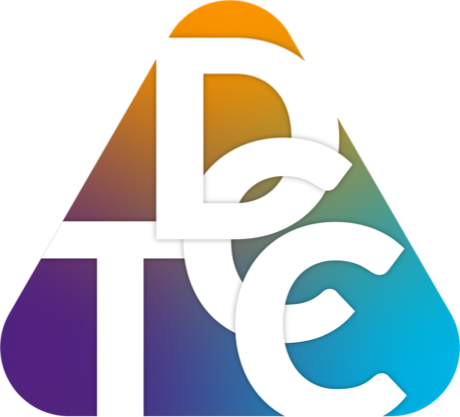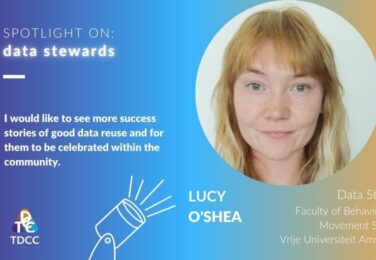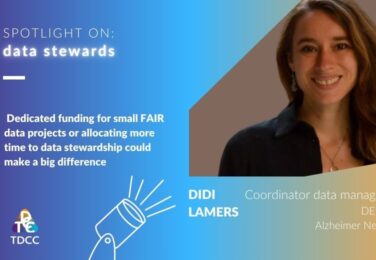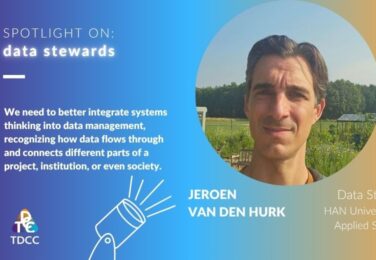
Spotlight on: Angelica Maineri
Every other week, the Thematic DCCs and the Data Steward Interest Group (DSIG) put the spotlight on one research data steward working in the Netherlands, to stimulate knowledge exchange and peer-to-peer learning.
What drew you towards the research data management field?
During my PhD, next to my own research I was also working for a large-scale international survey programme, where I executed a variety of data-related tasks ranging from variable harmonisation to data cleaning and documentation. In this way I contributed to the creation and publication of datasets that have been since used by hundreds of researchers worldwide. I felt this was more impactful than my own research, but back then I did not know that it was possible to build a career in academia outside of the “traditional” path. Throughout the PhD I struggled to reconcile the two strands of work - research and data management. Then I saw a vacancy as data manager at ODISSEI, the Dutch data infrastructure for the social sciences, which seemed like the perfect way to combine my data management skills with my research background in sociology and survey research - and I was right, because to do my job I must know about RDM and FAIR, but I also need to understand social sciences and methodology, and their substantive challenges.
What is an activity/task of your role that you find yourself looking forward to?
Something I really like about my position is to create connections between people and enable collaborations, which can mean different things depending on the context. Sometimes it is really about contributing my expertise or to bridge between tech and research to make sure a shared goal is achieved. For instance, I contribute my experience as a social scientist to technically improve the search functionalities of our ODISSEI Portal, a catalogue of metadata of social science data collections. Other times it is just about taking good notes and formulating clear action points to hold people accountable. The latter may be less rewarding, but it can still be important to make progress in a project at times, and it is also something that is often overlooked by researchers.
What is something unexpected that you can offer help with, if a colleague reaches out to you?
I enjoy making plots in R and I can be very stubborn, so if you reach out to me with a question on that, it’s likely I won’t leave the laptop until I have found the answer for you.
What do you think your community of research data professionals is missing?
Recognition - many data stewards and data managers do a fantastic job to help the researchers in their communities, yet their work often goes unnoticed or is taken for granted or even considered less “prestigious” than regular academic research. Instead, these are jobs that require multifaceted skills - you need to understand research, keep up with constant developments and updates in RDM, know how to develop training and educational material, and also have project management skills to manage the amount and variety of work. Our role should be properly acknowledged. Check out Esther Plomp’s spotlight interview for instance, she points out some great resources and initiatives on this. I would add that now that these professions have been around for a few years, it would be great if they were more visible as career options for those who are still studying or doing their PhDs (which also means offering relevant courses and training opportunities on RDM early on).
What is a topic you would want to collaborate on with others?
I would like to bring more Open Science into the SSH and I am open to collaborate on projects to achieve it. From my side, I am building the ODISSEI code library, a catalogue of analytical code written by researchers working with sensitive data (for now, CBS microdata and LISS panel data, but I want to expand it). The aim is to give more visibility to those who take the effort to publish their code and therefore incentivise code sharing practices, but also to help future users of the same data. Especially when it comes to CBS microdata, given how closed they are (as it should be, given their high level of sensitivity), it can be very helpful to be able to at least see from the code how others have processed, merged and analysed datasets. If you have ideas on how to improve/expand the library (I am also thinking in terms of training materials on how to properly share code) and want to collaborate on this, or just set up your own library, please reach out!
How would you like to see your current field of work evolve in the next 5 years?
I hope we can solve some of the technical challenges of FAIR/RDM, especially when it comes to sharing sensitive data in a secure way (see for instance the Secure ANalysis Environment - SANE). We can then devote more resources to the social and cultural aspects and make sure that a wider portion of the research community understands that FAIR, RDM and Open Science are not only checkboxes, but practices that are meant to accelerate scientific discovery and impact, and for which we need their active contribution.
Get in touch with Angelica on: website | ORCID | Linkedin | Twitter | Mastodon | Bluesky | GitHub
Do you want to read other interviews published in the Spotlight on series? Visit the series' page.
Are you a data steward or data professional who wants to be featured in one of the future editions? Fill out this form.



